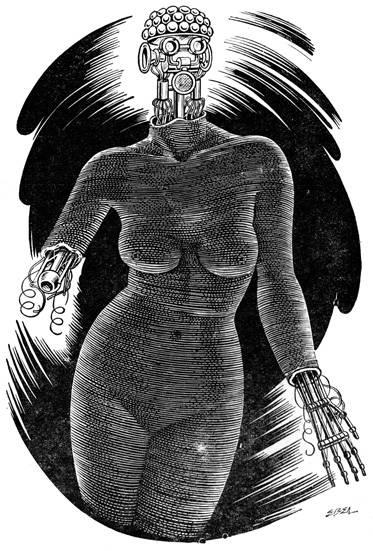push their way in before anyone has any idea.”
“I see,” Hendricks murmured.
From the other room Tasso stirred. “Major?”
Hendricks pushed the curtain back. “What?”

Tasso looked up at him lazily from the cot. “Have you any more American cigarettes left?”
Hendricks went into the room and sat down across from her, on a wood stool. He felt in his pockets. “No. All gone.”
“Too bad.”
“What nationality are you?” Hendricks asked after awhile.
“Russian.”
“How did you get here?”
“Here?”
“This used to be France. This was part of Normandy. Did you come with the Soviet army?”
“Why?”
“Just curious.” He studied her. She had taken off her coat, tossing it over the end of the cot. She was young, about twenty. Slim. Her long hair stretched out over the pillow. She was staring at him silently, her eyes dark and large.
“What’s on your mind?” Tasso said.
“Nothing. How old are you?”
“Eighteen.” She continued to watch him, unblinking, her arms behind her head. She had on Russian army pants and shirt. Gray-green. Thick leather belt with counter and cartridges. Medicine kit.
“You’re in the Soviet army?”
“No.”
“Where did you get the uniform?”
She shrugged. “It was given to me,” she told him.
“How—how old were you when you came here?”
“Sixteen.”
“That young?”
Her eyes narrowed. “What do you mean?”
Hendricks rubbed his jaw. “Your life would have been a lot different if there had been no war. Sixteen. You came here at sixteen. To live this way.”
“I had to survive.”
“I’m not moralizing.”
“Your life would have been different, too,” Tasso murmured. She reached down and unfastened one of her boots. She kicked the boot off, onto the floor. “Major, do you want to go in the other room? I’m sleepy.”
“It’s going to be a problem, the four of us here. It’s going to be hard to live in these quarters. Are there just the two rooms?”
“Yes.”
“How big was the cellar originally? Was it larger than this? Are there other rooms filled up with debris? We might be able to open one of them.”
“Perhaps. I really don’t know.” Tasso loosened her belt. She made herself comfortable on the cot, unbuttoning her shirt. “You’re sure you have no more cigarettes?”
“I had only the one pack.”
“Too bad. Maybe if we get back to your bunker we can find some.” The other boot fell. Tasso reached up for the light cord. “Good night.”
“You’re going to sleep?”
“That’s right.”
The room plunged into darkness. Hendricks got up and made his way past the curtain, into the kitchen.
And stopped, rigid.
Rudi stood against the wall, his face white and gleaming. His mouth opened and closed but no sounds came. Klaus stood in front of him, the muzzle of his pistol in Rudi’s stomach. Neither of them moved. Klaus, his hand tight around his gun, his features set. Rudi, pale and silent, spread-eagled against the wall.
“What—” Hendricks muttered, but Klaus cut him off.
“Be quiet, Major. Come over here. Your gun. Get out your gun.”
Hendricks drew his pistol. “What is it?”
“Cover him.” Klaus motioned him forward. “Beside me. Hurry!”
Rudi moved a little, lowering his arms. He turned to Hendricks, licking his lips. The whites of his eyes shone wildly. Sweat dripped from his forehead, down his cheeks. He fixed his gaze on Hendricks. “Major, he’s gone insane. Stop him.” Rudi’s voice was thin and hoarse, almost inaudible.
“What’s going on?” Hendricks demanded.
Without lowering his pistol Klaus answered. “Major, remember our discussion? The Three Varieties? We knew about One and Three. But we didn’t know about Two. At least, we didn’t know before.” Klaus’ fingers tightened around the gun butt. “We didn’t know before, but we know now.”
He pressed the trigger. A burst of white heat rolled out of the gun, licking around Rudi.
“Major, this is the Second Variety.”
Tasso swept the curtain aside. “Klaus! What did you do?”
Klaus turned from the charred form, gradually sinking down the wall onto the floor. “The Second Variety, Tasso. Now we know. We have all three types identified. The danger is less. I—”
Tasso stared past him at the remains of Rudi, at the blackened, smouldering fragments and bits of cloth. “You killed him.”
“Him?
“You were
Hendricks bent down beside her. The remains were human remains. Seared flesh, charred bone fragments, part of a skull. Ligaments, viscera, blood. Blood forming a pool against the wall.
“No wheels,” Tasso said calmly. She straightened up. “No wheels, no parts, no relays. Not a claw. Not the Second Variety.” She folded her arms. “You’re going to have to be able to explain this.”
Klaus sat down at the table, all the color drained suddenly from his face. He put his head in his hands and rocked back and forth.
“Snap out of it.” Tasso’s fingers closed over his shoulder. “Why did you do it? Why did you kill him?”
“He was frightened,” Hendricks said. “All this, the whole thing, building up around us.”
“Maybe.”
“What, then? What do you think?”
“I think he may have had a reason for killing Rudi. A good reason.”
“What reason?”
“Maybe Rudi learned something.”
Hendricks studied her bleak face. “About what?” he asked.
“About him. About Klaus.”
Klaus looked up quickly. “You can see what she’s trying to say. She thinks I’m the Second Variety. Don’t you see, Major? Now she wants you to believe I killed him on purpose. That I’m—”
“Why did you kill him, then?” Tasso said.
“I told you.” Klaus shook his head wearily. “I thought he was a claw. I thought I knew.”
“Why?”

